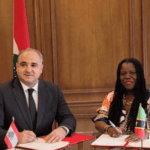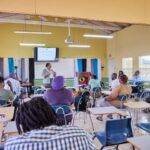BASSETERRE, Saint Kitts and Nevis, March 14, 2024 (PMO) – Less than two years after assuming political office, the Dr. Terrance Drew-led St. Kitts-Nevis Labour Party (SKNLP) government has propelled the twin-island Federation to the forefront of the Caribbean Community (CARICOM) in the 2023-24 Human Development Report (HDR).
Released by the United Nations Development Programme (UNDP) on Wednesday under the title “Breaking the Gridlock: Re-imagining Cooperation in a Polarized World,” the report highlights a country’s Gross National Income (GNI) per capita, education, and life expectancy.
According to the report, Saint Kitts and Nevis emerged as the highest-ranked CARICOM country, securing the fifty-first (51st) position among one hundred and ninety-three (193) nations surveyed, with an HDI index of 0.838 in 2023, marking a 0.006 percent improvement from the 2021 figure.
The report underscores a concerning global trend, with the rebound in the Human Development Index (HDI) projected to reach record highs in 2023 after significant declines in 2020 and 2021.
In the CARICOM region, Saint Kitts and Nevis’ achievement was followed by Antigua and Barbuda at 54 with an HDI index of 0.826, and The Bahamas at 57 with an HDI index of 0.920.
Trinidad and Tobago secured the 60th position with an HDI index of 0.814, followed by Barbados at 62 with an HDI index of 0.809. Grenada, St. Vincent and the Grenadines, Guyana, Dominica, St. Lucia, Jamaica, Belize, Suriname, and Haiti were also featured in the report.
The UNDP’s findings spotlight the challenges faced by Latin America and the Caribbean (LAC) region, particularly noting the significant drop in HDI during 2020-2021. The report emphasizes the need for social protection and resilience-building efforts to mitigate the impacts of such crises on human development trajectories.
In its report the UNDP said that uneven development progress is leaving the poorest behind, exacerbating inequality, and stoking political polarization on a global scale, warning that the result is a dangerous gridlock that must be urgently tackled through collective action.
Achim Steiner, head of the UN Development Programme, emphasized the urgent need for collective action to address global inequalities and tackle the emerging ‘democracy paradox,’ which poses a threat to democratic processes worldwide.
“The widening human development gap revealed by the report shows that the two-decade trend of steadily reducing inequalities between wealthy and poor nations is now in reverse. Despite our deeply interconnected global societies, we are falling short. We must leverage our interdependence as well as our capacities to address our shared and existential challenges and ensure people’s aspirations are met,” said Achim Steiner, head of the UN Development Programme.
“This gridlock carries a significant human toll. The failure of collective action to advance action on climate change, digitalization or poverty and inequality not only hinders human development but also worsens polarization and further erodes trust in people and institutions worldwide,” Steiner added.
As global interconnectedness deepens, the report calls for leveraging collective capacities to confront shared challenges and ensure equitable development for all, stressing that failure to do so not only hinders human development but also exacerbates polarization and erodes trust in institutions.
By prioritizing international cooperation and addressing systemic inequalities, the report advocates for a renewed commitment to advancing human development and fostering inclusive societies worldwide.
-30-













